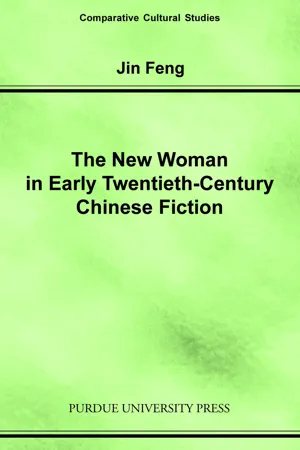
- 256 pages
- English
- ePUB (mobile friendly)
- Available on iOS & Android
New Woman in Early Twentieth-Century Chinese Fiction
About this book
In The New Woman in Early Twentieth-Century Chinese Fiction, Jin Feng proposes that representation of the "new woman" in Communist Chinese fiction of the earlier twentieth century was paradoxically one of the ways in which male writers of the era explored, negotiated, and laid claim to their own emerging identity as "modern" intellectuals. Specifically, Feng argues that male writers such as Lu Xun, Yu Dafu, Ba Jin, and Mao Dun created fictional women as mirror images of their own political inadequacy, but that at the same time this was also an egocentric ploy to affirm and highlight the modernity of the male author. This gender-biased attitude was translated into reality when women writers emerged. Whereas unfair, gender-biased criticism all but stifled the creative output of Bing Xin, Fang Yuanjun, and Lu Yin, Ding Ling's dogged attention to narrative strategy allowed her to maintain subjectivity and independence in her writings; that is until all writers were forced to write for the collective.
Feng addresses both the general and the specialized audience of fiction in early-twentieth-century Chinese fiction in three ways: for scholars of the May Fourth period, Feng redresses the emphasis on the simplistic, gender-neutral representation of the new women by re-reading selected texts in the light of marginalized discourse and by an analysis of the evolving strategies of narrative deployment; for those working in the area of feminism and literary studies, Feng develops a new method of studying the representation of Chinese women through an interrogation of narrative permutations, ideological discourses, and gender relationships; and for studies of modernity and modernization, the author presents a more complex picture of the relationships of modern Chinese intellectuals to their cultural past and of women writers to a literary tradition dominated by men.
Tools to learn more effectively

Saving Books

Keyword Search

Annotating Text

Listen to it instead
Information
Table of contents
- Cover Page
- Title Page
- Copyright
- Dedication
- Contents
- Acknowledgments
- Introduction: The New Woman
- Chapter One: Texts and Contexts of the New Woman
- Chapter Two: Books and Mirrors: Lu Xun and “the Girl Student”
- Chapter Three: From Girl Student to Proletarian Woman: Yu Dafu’s Victimized Hero and His Female Other
- Chapter Four: En/gendering the Bildungsroman of the Radical Male: Ba Jin’s Girl Students and Women Revolutionaries
- Chapter Five: The Temptation and Salvation of the Male Intellectual: Mao Dun’s Women Revolutionaries
- Chapter Six: “Sentimental Autobiographies”: Feng Yuanjun, Lu Yin and the New Woman
- Chapter Seven: The “Bold Modern Girl”: Ding Ling’s Early Fiction
- Chapter Eight: The Revolutionary Age: Ding Ling’s Fiction of the Early 1930s
- Epilogue: Ding Ling in Yan’an: A New Woman within the Party Structure?
- Appendixes
- Works Cited
- Index
Frequently asked questions
- Essential is ideal for learners and professionals who enjoy exploring a wide range of subjects. Access the Essential Library with 800,000+ trusted titles and best-sellers across business, personal growth, and the humanities. Includes unlimited reading time and Standard Read Aloud voice.
- Complete: Perfect for advanced learners and researchers needing full, unrestricted access. Unlock 1.4M+ books across hundreds of subjects, including academic and specialized titles. The Complete Plan also includes advanced features like Premium Read Aloud and Research Assistant.
Please note we cannot support devices running on iOS 13 and Android 7 or earlier. Learn more about using the app